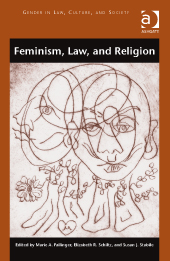Feminism, Law, and Religion

Feminism, Law, and Religion
Marie A. Failinger, Elizabeth R. Schiltz, Susan J. Stabile eds.
Ashgate 2013
Series : Gender in Law, Culture, and Society
With contributions from some of the most prominent voices writing on gender, law and religion today, this book illuminates some of the conflicts at the intersection of feminism, theology and law. It examines a range of themes from the viewpoint of identifiable traditions such as Judaism, Christianity, Islam and Buddhism, from a theoretical and practical perspective. Among the themes discussed are the cross-over between religious and secular values and assumptions in the search for a just jurisprudence for women, the application of theological insights from religious traditions to legal issues at the core of feminist work, feminist legal readings of scriptural texts on women’s rights and the place that religious law has assigned to women in ecclesiastic life.
Feminists of faith face challenges from many sides: patriarchal remnants in their own tradition, dismissal of their faith commitments by secular feminists and balancing the conflicting loyalties of their lives. The book will be essential reading for legal and religious academics and students working in the area of gender and law or law and religion.
Contents:
Foreword
Preface
Part I Feminist Legal Theory – Religious and Secular Encounters: A contemporary Catholic theory of complementarity, Elizabeth R. Schiltz; Deconstructing equality in religion, Cheryl B. Preston; The Catholic Church and women: the divergence between what is said and what is heard, Susan J. Stabile; What is the matter with Antigone?, Emily Hartigan.
Part II Theological Insights Applied to Dilemmas of Women’s Social Existence: Privatizing diversity: a cautionary tale from religious arbitration in family law, Ayelet Shachar; From third wave to third generation: feminism, faith, and human rights, M. Christian Green; A meditation on mahr, modernity and Muslim marriage contract law, Asifa Quraishi-Landes; Co-creating the family: a Lutheran view of marriage and divorce law, Marie A. Failinger; With compassion and lovingkindness: one feminist Buddhist’s exploration of feminist domestic violence advocacy, Deborah J. Cantrell; ‘Men are the protectors of women’ negotiating marriage, feminism and (Islamic) law in American Muslim efforts against domestic violence, Juliane Hammer; Why Muslim women are re-interpreting the Qu’ran and Hadith: a transformative scholarship-activism, Nimat Hafez Barazangi.
Part III Feminist Readings of Scriptural Texts on Women and Women’s Rights: Modesty disrobed – gendered modesty rules under the monotheistic religions, Frances Raday; Jewish law: the case of wife-beating, Naomi Graetz; Competing approaches to rape in Islamic law, Hina Azam. Part IV Women’s Leadership and Standing within Religious Communities: Catholic women and equality: women in the code of Canon Law, Sara Butler; Daughters of the Buddha: the Sakyadhita movement, Buddhist law and the position of Buddhist nuns, Rebecca Redwood French; Chinese women lawyers and judges as priests, Mary Szto; Index.
About the Editors:
Marie A. Failinger, Hamline University School of Law, was the long-time editor-in-chief of the Journal of Law and Religion. She writes on Lutheran theories of law and religion.
Elizabeth R. Schiltz, University of Saint Thomas School of Law, is Co-Director of the Terrence J. Murphy Institute for Catholic Thought, Law and Public Policy and a contributor to the Catholic legal theory blog Mirror of Justice. Her scholarship focuses on banking and consumer law, disability rights, and feminist legal theory, with a particular emphasis on the application of Catholic social theory.
Susan Stabile, University of Saint Thomas School of Law, writes on Catholic social thought within church institutions and as applied to corporate and labor theory. She is an Affiliate Senior Fellow of the St. John’s University Vincentian Center for Church and Society, a Research Fellow of the New York University School of Law Center for Labor and Employment Law, and a spiritual director.
Reviews:
‘This valuable book offers powerful new insights into the troubled relations between religion and feminism. The contributors go beyond facile dichotomies to show the paradoxes and complexities of the human condition. Cutting across different religions, the book offers a salutary understanding of how women experience – and often resolve – the tension between faith and feminism. We are on the threshold of a new phase in the politics of religion and gender, both globally and locally.’ — Ziba Mir-Hosseini, University of London, UK
‘The contributors expose relationships between legal idealism, feminist consciousness and religious and spiritual sensibilities that are nuanced and historically evolving. They not only provide pointed responses to secular feminist critiques of religious traditions, they also provide impassioned and caring analyses of ways in which those traditions, particularly when sympathetically interpreted through a feminist lens, can be enlisted in the causes of human liberation and wellbeing, worldwide.’ — Robin West, Georgetown University, USA
Extracts from this title are available to view: